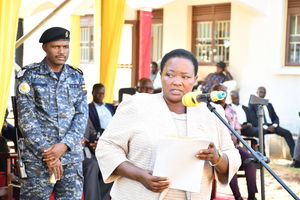Questions hover above budgeting process

Finance Minister Matia Kasaija arrives at Kololo before reading the budget last year. Mr Mukunda says “there is a higher force, beyond the Ministry of Finance, that influences how money is allocated”. Photo / File
What you need to know:
Parliament is due to reconvene on Tuesday to reconsider the President’s concerns that include reinstating Shs750b that was reallocated by legislators during the consideration of the Budget.
President Museveni’s decline to assent to the Appropriation Bill 2024 has further deepened concerns into the abuse of the budgeting process on the heels of arrests of individuals accused of collecting kickbacks to influence allocations.
Parliament is due to reconvene on Tuesday to reconsider the President’s concerns that include reinstating Shs750b that was reallocated by legislators during the consideration of the Budget.
Reports have indicated President Museveni’s displeasure with legislators for diverting funds from the Executive’s priorities to their constituencies. Legislators cut money from entities, including the maintenance of the Kyankwanzi Leadership Institute, the Ministry of Agriculture, and Treasury operations, among others.
Common practice is that the Executive, which originates the Budget, and the Legislature, which plays the appropriation role, harmonise positions before the passing of the Budget. Our efforts to seek answers to why President Museveni went back on the Budget he had endorsed at its reading on June 12 were futile by press time. Junior Finance minister Henry Musasazi, who was at the forefront of the process in Parliament, was not available for comment by presstime. Mr Opolot Isiagi, the head of the Budget Committee, and Mr Achia Remigio, his deputy, were also not available by press time.
Mr Jim Mugunga, the spokesperson of the Ministry of Finance, said: “Notwithstanding the consultative process that took place, as has been done before, the President has the prerogative for assent or not to assent, but it is not the first that he has returned Bills for reconsideration and in so doing he normally gives his reasons. As Finance at this point, the matter is out of our hands and a responsibility of Parliament, which we expect to proceed by Parliament procedures.”
Shadow Finance minister Ssemujju Nganda, however, described the handling of the 2024/2025 Budget as “the most chaotic Budget processing in Uganda’s history. As Parliament, we didn’t follow the Public Finance Management Act.”
A corrigendum that saw the Budget swell by Shs14 trillion was introduced on the eve of the passing of the Bill, a move several legislators say did not give the Committee on Budget sufficient time to comprehensively process the Bill.
“Did the Parliament debate the Budget? No. The report was read, and a question was put against the will of members because members wanted to debate the Budget. Did the MPs access all the documents that were in the Budget, especially the appendix for reallocations? It remained a secret document between the headship of Parliament, that’s the Speaker, and the headship of the Budget Committee,” Butambala representative Muwanga Kivumbi said.
While Kivumbi acknowledged that some legislators abuse the process and exploit that to allocate money to agencies where they can easily get a kickback, he maintained lobbying for funds to be reallocated to neglected priorities is permissible.
The reallocations made in the 2024/2025 Budget, he said, are informed by careful processes.
“If an entity continues to receive a budget, okay, but continuously doesn’t have the absorption capacity to consume that money in a given year and that trend has been consistent over a number of years, then there is no reason why Parliament must continue to allocate money which is being competed for elsewhere to an entity that will not consume it,” Mr Kivumbi said.
Mr Ssemujju said President Museveni “is using public anger against Parliament over corruption to settle old scores”.




